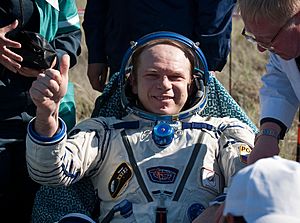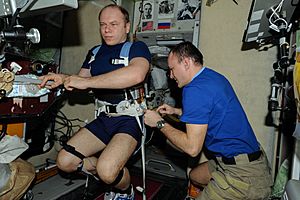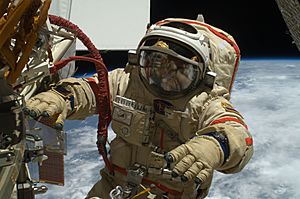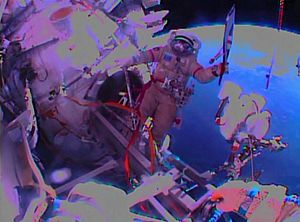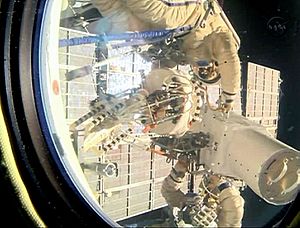Oleg Kotov facts for kids
Quick facts for kids
Oleg Valeriyevich Kotov
|
|
|---|---|
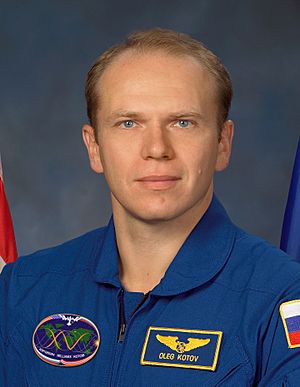
Kotov in 2006
|
|
| Born | 27 October 1965 |
| Status | Retired |
| Nationality | Russian |
| Occupation | Physician |
| Awards | Hero of the Russian Federation |
| Space career | |
| Roscosmos cosmonaut | |
| Rank | Lieutenant Colonel |
|
Time in space
|
526 days 5 hours 4 minutes |
| Selection | 1996 RKA Group |
|
Total EVAs
|
6 |
|
Total EVA time
|
36 hours and 51 minutes |
| Missions | Soyuz TMA-10 (Expedition 15), Soyuz TMA-17 (Expedition 22/23), Soyuz TMA-10M (Expedition 37/38) |
|
Mission insignia
|
 |
Oleg Valeriyevich Kotov (Russian: Олег Валериевич Котов) is a Russian cosmonaut. He was born on October 27, 1965, in Simferopol, which was then part of the Ukrainian SSR. Before becoming a cosmonaut, he worked as a doctor for the Soviet space program.
Kotov has flown into space three times. He spent over 526 days living and working on the International Space Station (ISS). His most recent space journey was from September 2013 to March 2014. During this time, he was part of the Expedition 37 and Expedition 38 crews.
Contents
About Oleg Kotov
Oleg Kotov is married to Svetlana Nikolayevna Kotova. They have two children: a daughter named Valeria, born in 1994, and a son named Dmitry, born in 2002. Kotov's parents, Valeri and Elena Kotova, live in Moscow. In his free time, Kotov enjoys diving, using computers, and photography.
Oleg Kotov's Education
Kotov finished high school in Moscow in 1982. He then went to the S. M. Kirov Military Medical Academy. He graduated from the Academy in 1988.
Awards and Honors
Oleg Kotov has received several important awards. These include the Hero of the Russian Federation medal. He also earned the Combat Heroism Russian Federation Armed Forces Medal. Additionally, he received Service Medals of different degrees.
Becoming a Cosmonaut
After graduating in 1988, Kotov worked at the Gagarin Cosmonaut Training Center. He was a test doctor, studying how space travel affects the human body. He helped train astronauts and provided medical support for spacewalks. He is also a certified scuba diver.
In 1996, Kotov was chosen to become a cosmonaut candidate. He completed his basic spaceflight training by March 1998. After that, he became a qualified test-cosmonaut. He then trained for missions to the Mir space station and the International Space Station.
From 1999 to 2004, Kotov worked in mission control centers. He helped guide space missions from both Moscow and Houston. He later became the chief of the CAPCOM (Capsule Communicator) branch. CAPCOMs are the only people who talk directly to astronauts in space.
Space Missions
Oleg Kotov has completed three long missions to the International Space Station. He has also performed several spacewalks.
Expedition 15 Mission
Kotov was a flight engineer for Expedition 15. He launched into space on April 7, 2007. He traveled aboard the Soyuz TMA-10 spacecraft from the Baikonur Cosmodrome. His crewmates were Fyodor Yurchikhin and space tourist Charles Simonyi.
Kotov returned to Earth on October 21, 2007. He had spent 196 days and 17 hours in space. The Soyuz TMA-10 capsule landed in Kazakhstan.
Expedition 22 and 23 Missions
Kotov commanded the Soyuz TMA-17 spacecraft. He was a flight engineer for Expedition 22 and then the commander for Expedition 23. Both missions were aboard the International Space Station.
On May 1, 2010, Kotov showed his amazing piloting skills. He manually guided a Progress supply spacecraft to dock with the ISS. The spacecraft had trouble docking on its own. Kotov took control and successfully connected it to the station.
Kotov returned to Earth on June 2, 2010. He landed safely in Kazakhstan aboard the Soyuz TMA-17 spacecraft.
Expedition 37 and 38 Missions
Kotov launched on Soyuz TMA-10M on September 25, 2013. He flew with Russian cosmonaut Sergey Ryazansky and American astronaut Michael Hopkins. They joined Expedition 37 as flight engineers.
On November 7, 2013, the ISS had nine people living on board. This was the first time since 2009 that so many people were on the station at once. Soon after, Kotov became the station commander for the second time.
Kotov and Ryazansky made history on November 9, 2013. They took an Olympic torch for a spacewalk. It was the first time an Olympic torch had ever been in space outside a spacecraft. Kotov returned to Earth on March 11, 2014. He had spent 166 days on the ISS during this mission.
Spacewalks
Oleg Kotov has performed six spacewalks during his career. Spacewalks are also called Extravehicular Activities (EVAs).
First Spacewalk
On May 30, 2007, Kotov began his first spacewalk. He was with Fyodor Yurchikhin. They spent 5 hours and 25 minutes outside the ISS. During this spacewalk, they installed special panels. These panels help protect the ISS from space debris.
Second Spacewalk
Kotov performed his second spacewalk on June 6, 2007. Again, he was with Yurchikhin. They installed an Ethernet cable on the Zarya module. They also added more protective panels to the Zvezda module. The spacewalk lasted 5 hours and 37 minutes.
Third Spacewalk
On January 14, 2010, Kotov went on his third spacewalk. He was joined by fellow Russian cosmonaut Maksim Surayev. They connected cables between different modules of the ISS. They also installed docking targets and handrails. This spacewalk lasted 5 hours and 44 minutes.
Fourth Spacewalk
Kotov performed his fourth spacewalk on November 9, 2013. He was with Sergey Ryazansky. This was the famous spacewalk where they took the Olympic torch outside the ISS. They also worked on installing equipment for future spacewalks. This spacewalk lasted 5 hours and 50 minutes.
Fifth Spacewalk
On December 27, 2013, Kotov and Ryazansky went on another spacewalk. They tried to install two cameras on the outside of the ISS. These cameras were meant to send live views of Earth to people on the internet. However, there were problems with the cameras, so they had to bring them back inside.
During this spacewalk, they also removed an experiment package. They then attached a new experiment to monitor earthquakes. This spacewalk lasted 8 hours and 7 minutes. It set a new record for the longest Russian spacewalk.
Sixth Spacewalk
Kotov performed his sixth spacewalk on January 27, 2014. He was again with Sergey Ryazansky. They completed some tasks that could not be finished on their previous spacewalk. They successfully installed a high-resolution camera. They also removed some old equipment from the ISS. This spacewalk lasted 6 hours and 8 minutes.
See also
 In Spanish: Oleg Kótov para niños
In Spanish: Oleg Kótov para niños
 | Aurelia Browder |
 | Nannie Helen Burroughs |
 | Michelle Alexander |


